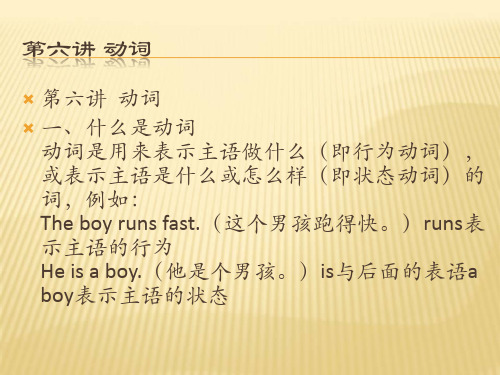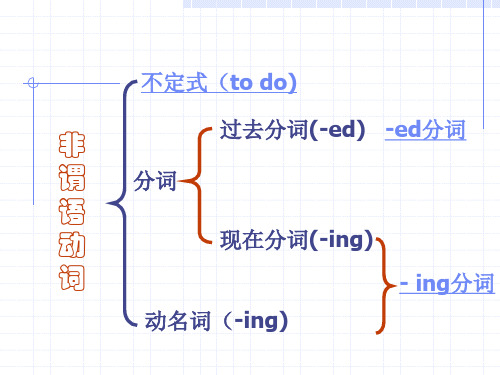专升本英语语法精品PPT课件
副词-专升本英语语法详细讲解课件

Have you been there already?
③做“还”讲时, yet用于否定句, still用于肯定 句、疑问句, 表示“依然、继续”, 有时也用于 否定句。
The rain hasn’t stopped yet.
It’s still raining now.
四.同源副词
A)
5.I used to smoke _______ but I gave it up three years ago.
A) seriously B) heavily C) badly D) severely
B)
6.The organization had broken no rules, but _____ had it acted responsibly. A) neither B) so
A) essentially B) completely C) necessarily D) remarkably
A)
3.Our journey was slow because the train stopped ________ at different villages.
A) unceasingly B) gradually C) continuously D) continually
4.so, neither与nor
三个词都能表示后者和前者情况相似。 so用于肯定句, neither和nor用于否定 句。
①He likes skating. So do I. ②The first one wasn't good, and
neither/nor was the second.
2. late, lately late意思是“晚”, lately意思为“近来” You have come too late. Have you see him lately?
专升本英语考试辅导 ppt课件

• This is the best film that I've (ever) seen.
专升本英语考试辅导
• When the police arrived, the thieves had run away.
• 现在完成时的时间状语:for, since, so far, ever, never, just, yet, till/until, up to now, in past years, always等 ,皆不确定的时间状语。
• I saw this film yesterday. (强调看的动作发生过了)
• When I was a child, I often played football in the street.
• Whenever the Browns went during their visit, they were given a warm welcome.
专升本英语考试辅导
• I decided to go to the library as soon as I _______. A) finish what I did B) finished what I did C) would finish what I was doing D) finished what I was doing
• be used to + doing: 对……已感到习惯,或"习惯 于",to是介词,后需加名词或动名词。例如:
•
He is used to a vegetarian diet.
•
专升本英语-PPT课件

先看问题,后读文章:看一题,读文章找答案; 再看第二题,再接着读文章。(一般情况下,文 章的顺序和问题的顺序一致)
抓住文章的第一段和每一段的第一句。一般文章 的第一段是提纲挈领的关键段,每一段的第一句 大多是这一段的关键句。
抓住每一句话的关键词,关键词主要是动词,尤 其是谓语动词。
I should have arrived here this morning, but the traffic is too heavy. I wonder why they’re so late. They should have been here an hour ago.
3. 情态动词表示推测的用法 1) can’t (表推测多用否定式,意为“不可能”)(对现在、将来)
条件句主句与现在事实相与过去事实相与将来事实相动词werewouldshouldcouldmight动词原形主语had动词过去分词wouldcouldshouldmighthave词过去分词if主语should动词原形if主语wereto动词原形wouldshouldcouldmight动词were精选ppt27wereyouwouldstudyenglishharder
doing (需要) The classroom building wants / needs painting. see sb. to do
doing
4. 分词 1. doing 与 done 的区别
1)时间 Don’t disturb the sleeping baby. boiling water / boiled water
Both problems are not difficult.
2. other, another, the other, others, the others another: 泛指众多中的另一个, 又一个,
专升本英语语法精品讲义ppt课件

9.It was a meeting________importance I did not realize at the time. A.which B.at which C.its D.whose 解析:定语从句修饰meeting,引导词whose在定语从句中
语法专练
1.I have seen the film,________leading actor is my
favourite. A.its B.that C.whose D.which 解析:定语从句修饰film,引导词在定语从句中作 leading actor的定语,表所属关系。 答案:C 2.The girl________everybody had thought could win a gold
的关系,whom作of的宾语。 答案:C
定语从句(二) 1.whom,which在定语从句中可作介词的宾语,这样的介词一
般放在whom,which之前也可放在原来的位置上。that也可作 介词宾语,但介词不能放在that前,只能放在原位置上;含有 介词的固定词组,介词也只能放在原位置上。 This is the nurse to whom Tom spoke just now.=This is the nurse whom Tom spoke to just now. 这就是那个Tom刚才跟她谈话的护士。 The child whom you take care of is ill.你照看的那小孩病了。
码”。后面是倒装句。 答案:C
7.I don’t like the way________he spoke to me. A.what B.by which C.by that D./ 解析:定语从句修饰way,引导词作状语时可用in which/that/不填。 答案:D
专升本语法第六章动词ppt课件

你来这儿之前学过英语吗?
d. 与否定副词not合用,构成否定句,例如:
I don‘t like him. 我不喜欢他。
e. 加强语气,例如:
Do come to the party tomorrow evening.
明天晚上一定来参加晚会。 He did know that. 他的确知道那件事。
3) 最常用的助动词有:be, have, do, shall, will, should, would
(2) 不及物动词 本身意义完整后面不须跟宾语的实义动词, 叫做不及物动词(intransitive verb)只能用于:"主+谓"结构。 如:
Birds can fly.鸟会飞。 My watch stopped.我的表停了。 She spoke at the meeting yesterday evening. 她在昨天晚上的会
11、close——be closed 12、lose——be lost
13、get to know——know 14、turn on——be on
15、get up——be up
16、sit down——sit/be seated
17、join——be in
18、become——be
(2)用it is…since…结构来替换瞬间动词,例如: 1.电影已经开映5分钟了。(两种方法)
第六讲 动词
第六讲 动词
一、什么是动词 动词是用来表示主语做什么(即行为动词), 或表示主语是什么或怎么样(即状态动词)的 词,例如: The boy runs fast.(这个男孩跑得快。)runs表 示主语的行为 He is a boy.(他是个男孩。)is与后面的表语a boy表示主语的状态
专升本英语定语从句ppt课件

关系代词
Who’s the boy that is reading a book? Can you show me the photo that you like best?
that:指人或物,作主语、宾语或表语
The boy is my classmate. The boy’s father is a policeman.
当先行词是人时,用”介词+whom”引导定语从句。 This is the man from whom I learnt the news. 当先行词是物时,用“介词+which”引导定语从句,而且只
能加which, 不能加that. I’ll never forget the days on which we lived
1. Those _w__h_o___ want to go to the museum must be at the
school gate at 7 tomorrow morning.
2. Yesterday I helped an old man _w__h_o__ had lost his way.
He is one of the students who _h_a__v_e_ made great progress.
Mr. Wang is the only one of my friends who _h_a_s_ been invited to have dinner with us.
(have)
Ben.
He was the only person that ( 为 什 么 不 用 who?) was
present at the time.
SK形容词和副词专升本英语语法综述ppt课件

A. silent B.silence C. quietly D.silencely
6. They all looked __D___ at the mistakes
and felt quite _____ .
A.sad; sad
B. sadly; sadly
C. sad; sadly
D. sadly; sad
C. basically
D. especially
13. (01北京春) In that case, there is
nothing you can do __B_ than wait.
A. more B. other C. better D. any
other than 除了
14.(NMET2004全国) I don’t mind picking up
fishing forms an actual part of their leisure time.
A. accidentally
B. purposefully
C. obviously
D. formally
16.(NMET2004天津) Mr Smith used to
smoke _B__ but he has given it up.
• adv. 作状语:可以修饰动词、形容词、其他副 词、介词短语或全句。
• The room is quite small and dark. (修饰形容词) • He worked out the problem very easily.(修饰
副词) • He got on that train fortunately. • Fortunately, he got on that train. (修饰全句)
专升本英语非谓语动词ppt课件

③ 作介词/短语动词的宾语: 主语 + 谓语 + 介词+ doing
prefer…..to…..
look forward to
be used to
e.g. ①ShS.e+
put off give up
skaetepthoenre
with+oudotinsgpeaking.
②③IAlroeoykscfeouaenfculoc`tleiruhekwdeesleipandrdtotolivseinegintghherime aalognaien?.
(4) 不定式作状语
• 表示目的、原因、结果或条件 • I came here to see you. (目的) • We were very excited to hear the news. (原因) • He hurried to the school to find nobody there. (结果) • To look at him,you would like him.(条件)
不定式的时态
一、不定式的一般式 to+动词原形,所表示的动作与谓语动词的动作是同时发生的或 是在其后发生的 She was seen to enter the hall. (was seen与to enter两个动作 同时发生) I have some new to tell you. (to tell所表示的动作发生在have 之后)
2) 常跟疑问词+不定式作宾语的动词:
tell, advise, show, teach, find out, decide, discuss, learn, explain… know, show, discover, see(understand) • He taught us how to use the tool. • No one could tell me where to get the book. • I hope you’ll advise me what to do.
专升本英语语法课件

3)I have bought an umbrella. (I bought an umbrella and I have it now.) 我买了一把伞.
2.现在完成时动词可以表示开始于过去持续到现在(也许还会继续进行下去)的动作或状 态.例如:
1)I have studied English since 1975. 我从一九七五年起就学习英语. 2)They have been in Beijing since 1949. 他们从一九四九年起就(住)在北京. 3)He has lived here for two years. 他住在这儿已经两年了. 4)He has been ill for ten days.他病了十天了. 注:come, go, leave, arrive, join, die, bury, 和marry等动词所表示的动作是一时的,
(试与 I have read three books this morning 比较. ) 2)He has been staying here for two hours. 他在这儿待了两个小时了.
(试与He was here for two hours 比较.) 3)She has been living there since 1970. 她从一九七O年以来就住在这里.
式 They have not (haven’t) studied.
疑 Have I studied? Have you studied?
问 Has he studied? Have we studied?
专升本英语语法精讲课件

专升本英语语法精讲课件教学内容:本节课的教学内容选自《专升本英语语法》教材,主要涵盖第五章动词的时态和语态。
本章内容是英语语法学习的重要部分,包括一般现在时、一般过去时、一般将来时、现在进行时、过去进行时、现在完成时、过去完成时、被动语态和主动语态等。
通过本章的学习,使学生掌握动词时态和语态的用法,能够正确表达时间、动作和状态等概念。
教学目标:1. 学生能够掌握动词的时态和语态的构成和用法;2. 学生能够正确运用动词的时态和语态表达时间、动作和状态等概念;3. 学生能够通过动词的时态和语态的运用,提高英语听说读写的能力。
教学难点与重点:重点:动词的时态和语态的构成和用法。
难点:一般将来时、过去进行时、现在完成时、过去完成时和被动语态的用法。
教具与学具准备:教具:多媒体课件、黑板、粉笔。
学具:教材、练习册、笔记本。
教学过程:一、情景引入(5分钟)教师通过多媒体课件展示一些日常生活中的照片,引导学生用英语描述照片中的动作和状态,从而引出动词的时态和语态的概念。
二、知识讲解(15分钟)教师在黑板上用粉笔写出动词的时态和语态的构成和用法,一边讲解一边示例,让学生直观地理解一般现在时、一般过去时、一般将来时、现在进行时、过去进行时、现在完成时、过去完成时、被动语态和主动语态的用法。
三、例题讲解(15分钟)教师通过多媒体课件展示一些例题,让学生观察并分析例题中动词的时态和语态的用法,然后给出答案并解释原因。
四、随堂练习(15分钟)教师发放练习册,让学生完成练习题,然后教师挑选一些学生的答案进行讲评和纠正。
五、课堂小结(5分钟)六、板书设计七、作业设计1. 请用一般现在时、一般过去时、一般将来时、现在进行时、过去进行时、现在完成时、过去完成时、被动语态和主动语态各写一个句子,并解释其用法。
答案:一般现在时:I like apples.(我喜欢苹果。
)一般过去时:I visited the museum yesterday.(我昨天参观了博物馆。
专升本英语语法PPT演示文稿

extracurricular
money laundrying
7
一 构词法
dis → disappear, disagree, dislike, dishonest, discontinue, disconnect, distract
mis→ mistake, mislead, misguide, misbelief,misunderstand
mal → malfunction, malnutrition, maltreat
-ist → tourist, artist, communist, dentist
ful/less → careful,careless, useful, useless, helpful, helpless
10
-ish → selfish, foolish, bookish, childish/childlike
the last person I want to see in this city.
3
6. Her mother died of difficult labor 7. Both of them are not my brothers.
Every man cannot be a writer. All that glitters is not gold. 8. During foggy weather the trains are late more often than not. 9. You should know better than to go swimming immediately after a meal.
4
10. Only that I know you might be wanted, I should detain you a little longer
强调专升本英语语法详细讲解课件.ppt

• 2. 考查“强调结构”与状语从句的辨析。 例如:
• It was evening _____we reached the little town of Winchester. A. that B. until C. since D. when
•D
• 3. 考查强调结构中的“not ... until 从 句”。例如: It was not until she got home_____ Jennifer realized she had lost her keys. A. when B. that C. where D. before
• Who was it that/who survived the plane crashes? Where was it that he picked up that book?
• 2. 特殊疑问句的强调结构用作宾语从句 时,只需把“is/was it”改为“it is/was” 即可。例如: The reporter asked who it was
强调结构
一、 强调结构的构成
• It is/was + 被强调部分 + that/who/whom + 句子的其他部分.
二、 强调结构所能强调的句子 成分
• 强调结构可以用来强调除了谓语以外的 句子成分。如果被强调的成分是主语,且 主语指人时,用that或who; 若被强调的 成分是宾语,且宾语指人时,用that或 whom; 强调其他成分时一律用that。 例 如:
B
• 4. 考查疑问句的“强调结构”作宾语。例
如:
I just wonder _____that makes him
so excited.
专转本非谓语动词ppt课件

10
最新版整理ppt
不定式多用于还未进行的动作 P187.34 不定式的否定形式:Not放在 to do之前
11
最新版整理ppt
As is expected, the government is taking measures _____ the spread of Bird Flu.(P198.26)
allow / advise /forbid / permit doing sth. allow / advise /forbid / permit sb. to do sth. 如:We don’t allow smoking here. We don’t allow students to smoke.
wonderful place to ____ in
12
A. live . living
C. be living D. be lived
最新版整理ppt
只用不定式
一、下面动词只能用不定式作宾语 Decide / determine, learn, want, expect / hope /
wish, refuse, manage, care, pretend, offer, promise, choose, plan, agree, ask / beg, help 例如: ① She pretended not to see me when I passed by. ② We agreed to meet here but so far she hasn’t turned up yet.
最新版整理ppt
All flights _______because of the strike, they had to find some other means of transportation.(2018.24)
英语专转本非谓语动词ppt课件

•She keeps buying expensive clothes.
agree to(同意) adapt to(适应) apply to(适用于) approve of(同意) be accustomed to(习惯于) be afraid of(害怕) be fond of(喜欢) be good at(擅长) be intent on(专心于) be interested in(感兴趣) be opposed to(反对的) be sick of(厌恶) be successful in(成功) be tired of(厌倦) be worried about(不开心)
动词不定式(to do)
1不定式做主语 2不定式做表语 3不定式做宾语 4不定式做宾语补足语 5不定式做定语 6不定式做状语 7不定式用法注意事项
To do that sort of thing is foolish.
Subject (主语) It is foolish to do that sort of thing.
式 )
(定语)
She came here to study English.
Adverbial (状语)
He lifted a stone only to drop it on his own feet. They jumped with joy to hear the news.
Complement The patient was warned not to eat oily food
I awoke to find my truck gone.
我醒来发现箱子不见了。
专升本一英语语法概要PPT课件

5. 表语(Predicative) 它在联系动词之后 表示主语的性质、特征、状态或身份的部分。 可有n,pron,adj,adv,num,to-do,ving,clause担任。如:
①.Susan is always careless.
②.Her job is to look after the children.
(5) What we shall do next is
not yet decided.
1. (6) Two thirds of the students
2.
are the boys in our
school.
(7) It doesn’t matter whether
he will come or not.
going to be a teacher. (5) The children ran away
它可以是一个词或是几个词或者 一个词组,或者是个句子。位置比较 灵活,可在名词前后。 1. (1)The yellow bike is mine. 2. (2) A very valuable bronze 3. Egyptian cat.
(3) The man who gave us a report yesterday was a model worker.
故,整个一句话的意思就是: 行为主义者认为, 如果儿童的 成长环境里有许多刺激因素, 这些因素又有利于其适当反应 能力的发展, 那么, 儿童的智 力就会发展到较高的水平。
1>. 主语(Subject) 它是句子的主体,是“什么 人,什么事,什么物”的问题。常由 n,pron,num,to-do,-ving,clause 担任。
一 英语语法概要
- 1、下载文档前请自行甄别文档内容的完整性,平台不提供额外的编辑、内容补充、找答案等附加服务。
- 2、"仅部分预览"的文档,不可在线预览部分如存在完整性等问题,可反馈申请退款(可完整预览的文档不适用该条件!)。
- 3、如文档侵犯您的权益,请联系客服反馈,我们会尽快为您处理(人工客服工作时间:9:00-18:30)。
第一讲.时
态
(一)现在完成时 (1)构成
have/has+过去分词 现在完成时的否定式/ 疑问式和简单回答形式:
否 I have not (haven’t) studied. You have not (haven’t) studied.
定 He has not (hasn’t) studied. We have not (haven’t) studied
It is two years since he left Beijing.
It is three years since he joined the Army.
式 They have not (haven’t) studied.
疑 Have I studied? Have you studied?
问 Has he studied? Have we studied?
式 Have they studied?
否 Have I not studied? (Haven’t I studied?) 定 Have you not studied? ( Haven’t you studied?) 疑 Has he not studied? (Hasn’t he studied?) 问 Have we not studied? (Haven’t we studied?) 式 Have they not studied? (Haven’t they studied?)
注: have gone to和have been to在意义上有区别.例如: 1)He has gone to Hangzhou.他到杭州去了. (他已前往杭州,或在途中,或已到达.说话人认为他现在在该地.) 2)He has been to Hangzhou.他曾到过杭州. (说话人认为他过去到过杭州,现在已经不在该地.)
2.现在完成时动词可以表示开始于过去持续到现在(也许还会继续进行下去)的动作或状 态.例如:
1)I have studied English since 1975. 我从一九七五年起就学习英语. 2)They have been in Beijing since 1949. 他们从一九四九年起就(住)在北京. 3)He has lived here for two years. 他住在这儿已经两年了. 4)He has been ill for ten days.他病了十天了. 注:come, go, leave, arrive, join, die, bury, 和marry等动词所表示的动作是一时的,
不能延续的,故不能与for …, since …等开头的表示一段时间的状语连用. 如不能说:*He has come to Beijing for seven years.
*He has left Beijing for two years.
*He has joined the Army for three years.
If you put your hear into it, you will find it easy.
第一讲. 时 态
• 英语主要靠动词本身形式的变化来表示动作的时间,副词的作用不大, • 语助词几乎没有。 • 英语的句子,除少数特殊情况外,只要都离不开时态,都以一定的 • 时态出现。换言之,只要是句子,就有时态问题。理由很简单:一个 • 句子必须有主语和谓语动词(主要动词),而后者总是用于某一时态。 • 学英语,时态是逃避不了的,但它并不是一个消极的因素。恰好 • 相反,它有很强的表达力,能使句子的意思明确,能显示细微的差别, • 有时还能使句子生动有趣。 • 一般英语有12种时态,即现在,过去,将来三大类,每一类中又分为 • 一般,进行,完成,完成进行4种。 •
4)The concert has started. (The concert started and is now going on.) 音乐会已经开始.
5)I have had breakfast. (I had breakfast and I am not hungry now.)我已吃过早饭.
2)I have opened the window. (I opened the window and the window is open now.) 我已把窗户打开.
3)I have bought an umbrella. (I bought an umbrella and I have it now.) 我买了一把伞.
*His father has died for five months. 可以说:He has been in Beijing for seven years.
He has been away from Beijing for two years.
He has been in the army for three years. His father has been dead for five months. 或: It is seven years since he came to Beijing.
简 Yes, you have. No, you haven’t. 单 Yes, I have. No, I haven’t. 回 Yes, he has. No, he hasn’t. 答 Yes, we have. No, we haven’t.
Yes, they have. No, they ’t.
(2)用法 1.在未指明具体时间的情况下,现在完成时动词通常可以表示在说话之前已经完成,而后 果或影响至尽仍存在的动作.现在完成时把过去的动作和现在的结果联系起来.过去时只 限于表示过去的动作本身,与现在的结果无关.例如:
1)He has gone to shanghai. (He went to shanghai and he is not here now.) 他已经去上海了.
